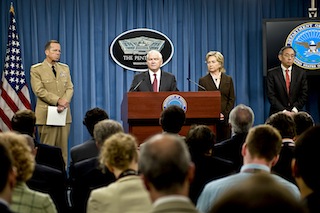U.S. Nuclear Posture Review Had a Positive Impact on States
Featured Image
Today's top nuclear policy stories, events, and analysis with excerpts in bullet form.
Stories we're following today - Wednesday, April 20, 2011:
After the Nuclear Posture Review: Obama's Disarming Influence - Scott Sagan in The Bulletin of Atomic Scientists [link]
- A recent examination of key foreign governments' responses to the Nuclear Posture Review...showed that Obama's policy significantly influenced a number of countries' nuclear doctrines and diplomatic postures.
- To further enhance the credibility of Obama's pledge to work in good faith toward a world free of nuclear weapons, the administration should order additional reductions in US nuclear weapons beyond those required by the New START agreement.
- The new Nuclear Posture Review helped move the debate in many foreign governments in a positive direction, and created new opportunities for international cooperation in nonproliferation and disarmament. Seizing those opportunities will be the next challenge for Obama's nuclear leadership.
Russia Pulling Out of $1B Western Aid Program that Supported Ex-Soviet Weapons Scientists - Douglas Birch for The Associated Press
- Russia is pulling out of a program that poured $1 billion from the U.S. government and other foreign donors into the research labs that built the Soviet Union's vast arsenal of weapons of mass destruction.
- The program helped pay the salaries of Russian weapons scientists who otherwise might have sold their services to rogue regimes or terrorists after the Cold War, but it long outlived the crisis that inspired its creation.
A Career U.S. Intelligence Officer on Al Qaeda, Nuclear Terrorism and the Nuclear Threat - Interview with Rolf Mowatt-Larssen in The Huffington Post [link]
- Al Qaeda's WMD warnings are not part of some theological exercise...they are laying the groundwork in providing the required justification and serial warnings in advance of a future attack.
- Nuclear terrorism is a preventable catastrophe. It is very difficult for terrorists to buy, steal or build a bomb...
- The first order of business is to deny terrorists the capability they seek. The most critical task is to fulfill the historic nuclear security summit's goal of locking up all weapons-usable nuclear materials as soon as possible, preferably in the next four years.
Memo to Congress: The UN works - Johan Bergenas for The Hill's "Congress Blog" [link]
- Last week Congress voted to cut its contributions to the United Nations by 20 percent and the John Boltons of the world continue to scorn the organization. Yet, when it comes to the U.N. preventing the spread of the atomic bomb, its recent impact is of nuclear proportions.
- Consider the gains made concerning the development of Iran’s nuclear program...And when it comes to multilateral treaties, in the last few years the Nuclear Nonproliferation Treaty - the accord banning all but five states from acquiring nuclear weapons - has gained in strength.
- Undeniably, the United States’ strong normative contributions to the multilateral organization in recent years have played a pivotal role. Without American engagement and its recognition of the U.N. as a legitimate and important actor, the U.N. is less effective.
EVENT: Arms Control Association Annual Meeting - Reducing the Nuclear Danger: Next Steps on the Test Ban Treaty and Nuclear Arms Reductions [link]
- Tuesday, May 10, 2011, 9:00 AM - 4:00 PM
- Carnegie Endowment for International Peace, Root Room
- 1779 Massachusetts Ave. NW, Washington, D.C.
The Lighter Side



